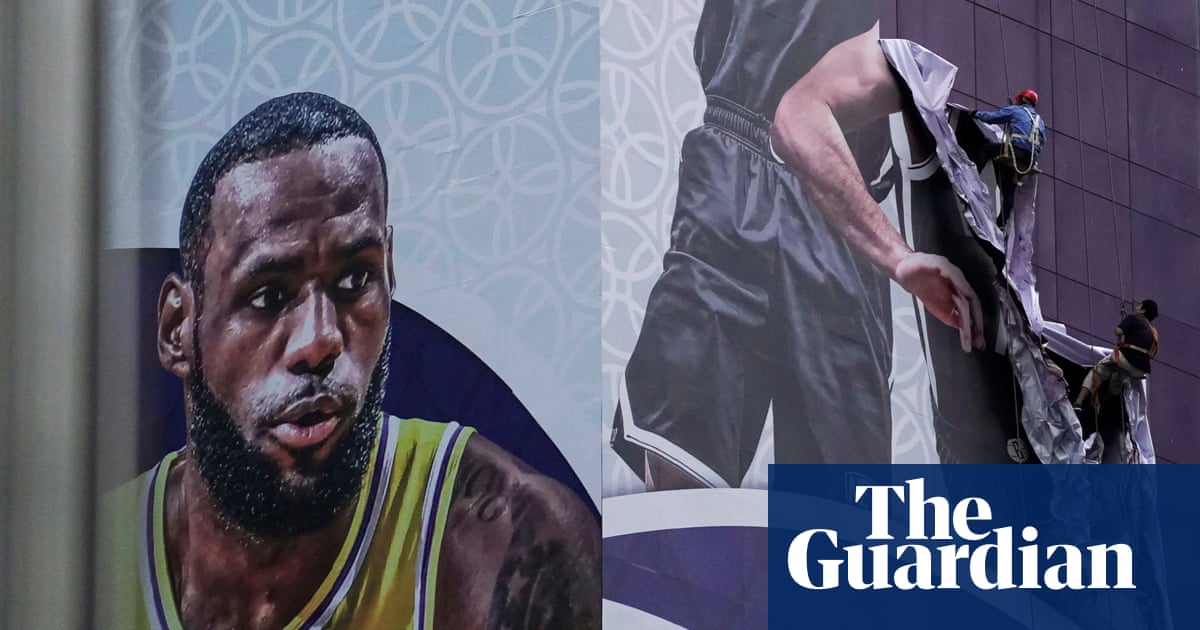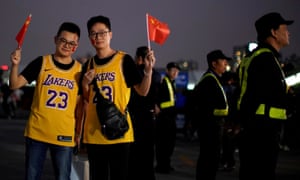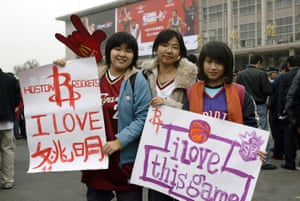The worlds premier basketball league has spent decades cultivating the multibillion-dollar Chinese market, but the fallout from a single tweet has threatened to upset it all

For Lisa Delpy Neirotti, the surest sign of the National Basketball Associations booming business in China came during her morning commute.
It was two years ago, and Delpy Neirotti, a sports management professor at George Washington University, was guest lecturing at Beijing Sports University. Riding the subway on her way to campus, she noticed other passengers watching NBA contests live on their smartphones.
It wasnt just one or two people, it was a number of them, said Delpy Neirotti, who has repeatedly traveled to China since the late 1980s. 8pm on the east coast is 8am there, so the games fall at a really good time.
When you walk through train stations, you see [Golden State Warriors star] Steph Curry everywhere. Were not talking small signs. Its large billboards of him holding a phone or something. Of all the sports, basketball is the one that [Chinese people] follow most. And those who follow are very passionate.
For decades, the NBA has worked to cultivate that passion, transforming China into the leagues most lucrative market outside of the United States. But now those efforts are in jeopardy, with the fallout from a tweet from a Houston Rockets executive supporting protests in Hong Kong straining relations between the worlds premier basketball league and its second-largest economy.
In the aftermath of the since-deleted tweet from Rockets general manager Daryl Morey that prompted condemnation from Chinas government and outcry from the countrys state-run media, several Chinese companies and brands have suspended or cut ties with the NBA.
Meanwhile, league commissioner Adam Silver has disregarded Chinese calls to punish Morey or condemn his tweet, instead following an initial apology that trigged backlash in the US with a longer statement supporting the right of NBA players and employees to speak freely in accordance with American values.
The result is an unresolved standoff set against the geopolitical backdrop of an ongoing US-China trade war and the continuing Hong Kong protests in which neither side seems eager to escalate nor willing to back down.
To wit: while the Los Angeles Lakers and Brooklyn Nets still were set to play a previously-scheduled exhibition game Saturday in Shenzhen, their Thursday contest in Shanghai was devoid of domestic advertising and not broadcast by Chinese media. Customary news conferences for players and Silver were cancelled by Chinese officials.
The larger stakes? A heretofore lucrative relationship among the NBA, its business partners and their counterparts in China.
Were not taking about a couple [former Houston Rockets player and Chinese basketball superstar] Yao Ming jerseys being sold in China, says Warren K Zola, a Boston College professor and sports business expert. Were talking about billions of dollars coming in.
This is an enormous tipping point for the league. Theyve targeted China as a market for the short and long term. And it has come to fruition. But then you have their social activism stance. The NBA and Adam Silver have been incredibly supportive of their players and employees being vocal.
So you have this tension money versus the rights given to people here in the United States in the Constitution. Its a huge conflict.
A quick firestorm
The conflict began last Friday night, when Morey tweeted an image that read, Fight for freedom, stand with Hong Kong.
Hong Kongs demonstrations started in June to protest a proposed extradition law that many city residents saw as a threat to the limited autonomy and additional rights including freedom of speech and assembly enjoyed by the former British colony since its handover to China in 1997.
The protests have since evolved to include demands for full democracy, and clashes between activists and police have sometimes been violent.
Chinas government and state media have painted the protestors as dangerous separatists challenging the nations sovereignty at the behest of American intelligence agencies, using the situation to stoke nationalist sentiment.
Unsurprisingly, Chinese reaction to Moreys tweet was overwhelmingly negative. Telecom giant Tencent and state broadcaster CCTV suspended broadcasts of Rockets games, while other sponsors suspended relations with the team. The Chinese Basketball Association, chaired by Yao, followed suit.
China has always been extremely sensitive on the issue of sovereignty, but part of this has to do with timing, said Bruce Dickson, a professor of political science and international affairs at George Washington University and an expert on China. [Moreys] tweet came in the middle of a long national holiday, right after the 70th anniversary of the founding of the [Peoples Republic of China].
Its also a time when the government is trying to stoke nationalism, and pin Hong Kong on foreign influences trying to interfere with their internal affairs. That resonates with Chinese audiences. And to top it all off, its the Houston Rockets. If theres any NBA team thats popular in China, its them. All of those things made this a quick firestorm.

In response, Rockets owner Tilman Fertitta publicly rebuked his general manager. The teams star guard, James Harden, apologized for Moreys tweet. Joseph Tsai, the Canadian-Taiwanese owner of the Nets and co-founder of the Chinese e-commerce giant Alibaba, posted an open letter that invoked the Opium Wars of the mid-19th century and said that the damage from the tweet would take a long time to repair.
The NBA released a statement in Mandarin expressing disappointment in Morey. That led to criticism in America, with Republican senator Ted Cruz and Democratic presidential candidate Beto ORourke blasting the league, respectively, for shamefully retreating and prioritizing profits over human rights.
While speaking in Japan on Tuesday, Silver backtracked, stating that the NBA is not apologizing for Daryl exercising his freedom of expression.
That stance was congruent with leagues previous acceptance of its players and coaches speaking out about off-court issues, including police brutality and the presidency of Donald Trump. But it did nothing to soothe anger in China, where NBA business partners including a travel website, a milk producer and a smartphone maker publicly announced that they were suspending or ending their relationships with the league.
CNN subsequently reported that a Chinese man wearing a Rockets jersey was arrested for posting a photo of himself ready to burn his countrys flag with the comment: I live and die with this team.
Hu Xijin, the editor of Chinas most prominent state-run newspaper, published an essay on the blogging site Weibo that read in part, the more rabidly the US demonstrates its political correctness, the more radical a backlash it will get from the Chinese Internet. The absurd US arrogance will kill the NBAs market in China.
An enormous market
If the league is unable to resolve its differences with China, then it could pay a heavy price for supporting free speech.
Brought to China by Christian missionaries in the late 19th century, basketball has a long history in the country. One of the few Western cultural activities not frowned upon during the Cultural Revolution, it was promoted by Mao Zedong and became particularly popular within the Chinese military.
In 1979, the Washington Bullets became the first NBA team to play in China, and six years later the Chinese national team toured the US at the invitation of then-league commissioner David Stern. Stern brought a demo tape to Beijing in 1987, cutting a deal with CCTV to show videotapes of games delivered weekly from New York.
In the 1990s, Michael Jordan and the Chicago Bulls helped popularize the league with Chinese viewers, and the Rockets selection of Yao with the top pick in the 2002 NBA draft supercharged interest. CCTV began showing NBA games live; Yaos first game, against Shaquille ONeal and the Lakers, was said to have drawn an audience of more than 200m viewers.
The NBA estimates that more than 300m people in China play basketball a number thats nearly as large as the total US population. Last year, 800m Chinese viewers watched league programming on television or digital platforms, while more than 150m followed the league on social media. Forty million Chinese gamers were registered to play the NBA 2K video game.
To capitalize on its status as the most popular sports league in a country of 1.4bn people, the NBA has staged nearly 30 games in China since 2004 (over 14 of the past 15 seasons), established offices in Hong Kong, Beijing and Shanghai, and opened basketball academies and 200 streetwear-themed NBA Style stores across the country.

And investing in China has paid off. Earlier this year, the league extended its digital rights deal with Tencent for a reported $1.5bn over five years, making the telecom the NBAs largest partner outside the US.
According to Bloomberg, both the league and its teams have a number of other sponsorship deals and a NBA representative told the news organization that the leagues business in China has grown at double-digit percentages every year since 2008.
China has been a gold mine for NBA players and apparel manufacturers, too. Warriors star Klay Thompson has a contract with the Chinese shoe company Anta worth a reported $80m. Retired star Dwyane Wade has a lifetime deal with rival Li-Ning.
Nike, which supplies the NBA with uniforms and counts Lakers star LeBron James among its many league endorsers, sold $6.21bn worth of merchandise in China in the 2019 fiscal year. The company reportedly has enjoyed sales growth in the country of over 10% in every quarter for more than five years, thanks largely to sales from its Jordan Brand and Nike Basketball.
Last year, NBA deputy commissioner Mark Tatum told Forbes that NBA China, which was founded in 2008 and is the only separately incorporated league business outside of the US, was worth $4bn.
China is an absolutely enormous market for the NBA in terms of finances, eyeballs, future growth, Zola said. You have the worlds largest population and soon to be the largest economy. And its huge for the players, too. Several have deals with Chinese companies Klay Thompson, [Portland guard] CJ McCollum, [Boston forward] Gordon Hayward.
When Curry launched a new line of signature golf apparel with Under Armour in June, he did so from a course in Shenzhen.
NBA players like to take it easy in the summer after a long season, Zola said. But the one place youll see them go for a week or two is a tour of China.
A tough spot
Earlier this week, a league source told the Houston Chronicle that fallout from Moreys tweet could cost the Rockets between $10m and $25m.
Meanwhile, Yahoo Sports reported that at least five NBA teams already were planning for the possibility that the leagues salary cap for the 2020-21 season could drop between 10% and 15% without expected revenue from China, a loss of roughly $17m per team.
Long-term losses for the NBA could be far greater. Like many international firms, the league is betting on the continued growth of Chinas middle class, which is expected to reach 550m people in three years more than one-and-a-half times the entire current US population.
When Fertitta purchased the Rockets for $2.2bn in 2017 and when Tsai recently bought the Nets at a valuation of $2.35bn, sale prices were bolstered by the prospect of an increasingly robust Chinese basketball market.
Theres still room for growth there, and for engaging fans, Delpy Neirotti said. Theres still room for growth in terms of Internet and social media followers, too.
Faced with Chinese ire for perceived support of Tibet or independence or democratic movements in Hong Kong and Taiwan, many American and international corporations have followed a similar playbook: censor the offensive statement, punish the offending employees, and publicly apologize for hurting the feelings of the Chinese people.
Just this week, US video game maker Activision Blizzard suspended professional gamer Chung Ng Wai from an esports tournament and stripped him of his earnings after he appeared to shout Liberate Hong Kong, revolution of our time during a post-match interview streamed in Taiwan. Following criticism from the Chinese Communist Partys official newspaper, Apple removed an app from its store that Hong Kong protestors have used to track police movements.
China using this pressure strategy on private companies mostly works, and it works because companies are worried about losing access to the Chinese market, Dickson said. Theyve usually rolled over. Quietly, but nevertheless rolled over.
So far, the NBA has taken a different approach likely, in part, because the league was roundly criticized in the US for initially appearing to kowtow to China.
A bipartisan group of eight Congressional members including Cruz and Democratic congresswoman Alexandra Ocasio-Cortez sent a letter to Silver on Wednesday urging the league to suspend its activities in China until broadcasters and sponsors end their boycotts and to reevaluate having a youth basketball training center in Xinjiang, where China reportedly has created a cruel and repressive police state for the regions Muslims.
The NBA has to worry about the American audience, too, Dickson said. Now that you have people in Congress reacting, Silver is in a tough spot. He is trying to please two different audiences with two very different sets of priorities.
Compared to other foreign companies that have found themselves in conflict with Chinas government, Dickson added, the NBA may have unique leverage. The countrys consumers love its product in the way that only sports fans can, which may make them quick to forgive. And stars such as Curry and James cant be copied or easily replaced with domestic knockoffs.
The league may have calculated correctly. On Thursday, the New York Times reported that China was directing editors at state-run newspapers to deemphasize their coverage of the dispute with the NBA, fearing it could attract unwanted global attention to the Hong Kong protests and spoil a new round of trade talks in Washington.
I think it will get better, Zola said. There is too much money at stake. To some extent, youre seeing that in the games that are being played in China. Silver called their bluff. They threatened to cancel the games. There were restrictions and concerns. But the stadiums are sold out and the players are playing. Ultimately, big business will solve hurt feelings.


Recent Comments